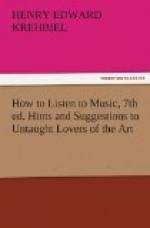The growth of the accompanied recitative naturally
brought with it emancipation from the tyranny of the
classical aria. Wagner’s reform had nothing
to do with that emancipation, which had been accomplished
before him, but went, as we shall see presently, to
a liberation of the composers from all the formal
dams which had clogged the united flow of action and
music. We should, however, even while admiring
the achievements of modern composers in blending these
elements (and I know of no more striking illustration
than the scene of the fat knight’s discomfiture
in Ford’s house in Verdi’s “Falstaff”)
bear in mind that while we may dream of perfect union
between words and music, it is not always possible
that action and music shall go hand in hand. Let
me repeat what once I wrote in a review of Cornelius’s
opera, “Der Barbier von Bagdad:"[F]
[Sidenote: How music can replace incident.]
“After all, of the constituents of an opera, action, at least that form of it usually called incident, is most easily spared. Progress in feeling, development of the emotional element, is indeed essential to variety of musical utterance, but nevertheless all great operas have demonstrated that music is more potent and eloquent when proclaiming an emotional state than while seeking to depict progress toward such a state. Even in the dramas of Wagner the culminating musical moments are predominantly lyrical, as witness the love-duet in ‘Tristan,’ the close of ’Das Rheingold,’ Siegmund’s song, the love-duet, and Wotan’s farewell in ‘Die Walkuere,’ the forest scene and final duet in ‘Siegfried,’ and the death of Siegfried in ’Die Goetterdaemmerung.’ It is in the nature of music that this should be so. For the drama which plays on the stage of the heart, music is a more truthful language than speech; but it can stimulate movement and prepare the mind for an incident better than it can accompany movement and incident. Yet music that has a high degree of emotional expressiveness, by diverting attention from externals to the play of passion within the breasts of the persons can sometimes make us forget the paucity of incident in a play. ’Tristan und Isolde’ is a case in point. Practically, its outward action is summed up in each of its three acts by the same words: Preparation for a meeting of the ill-starred lovers; the meeting. What is outside of this is mere detail; yet the effect of the tragedy upon a listener is that of a play surcharged with pregnant occurrence. It is the subtle alchemy of music that transmutes the psychological action of the tragedy into dramatic incident.”
[Sidenote: Set forms not to be condemned.]
[Sidenote: Wagner’s influence.]
[Sidenote: His orchestra.]
[Sidenote: Vocal feats.]




